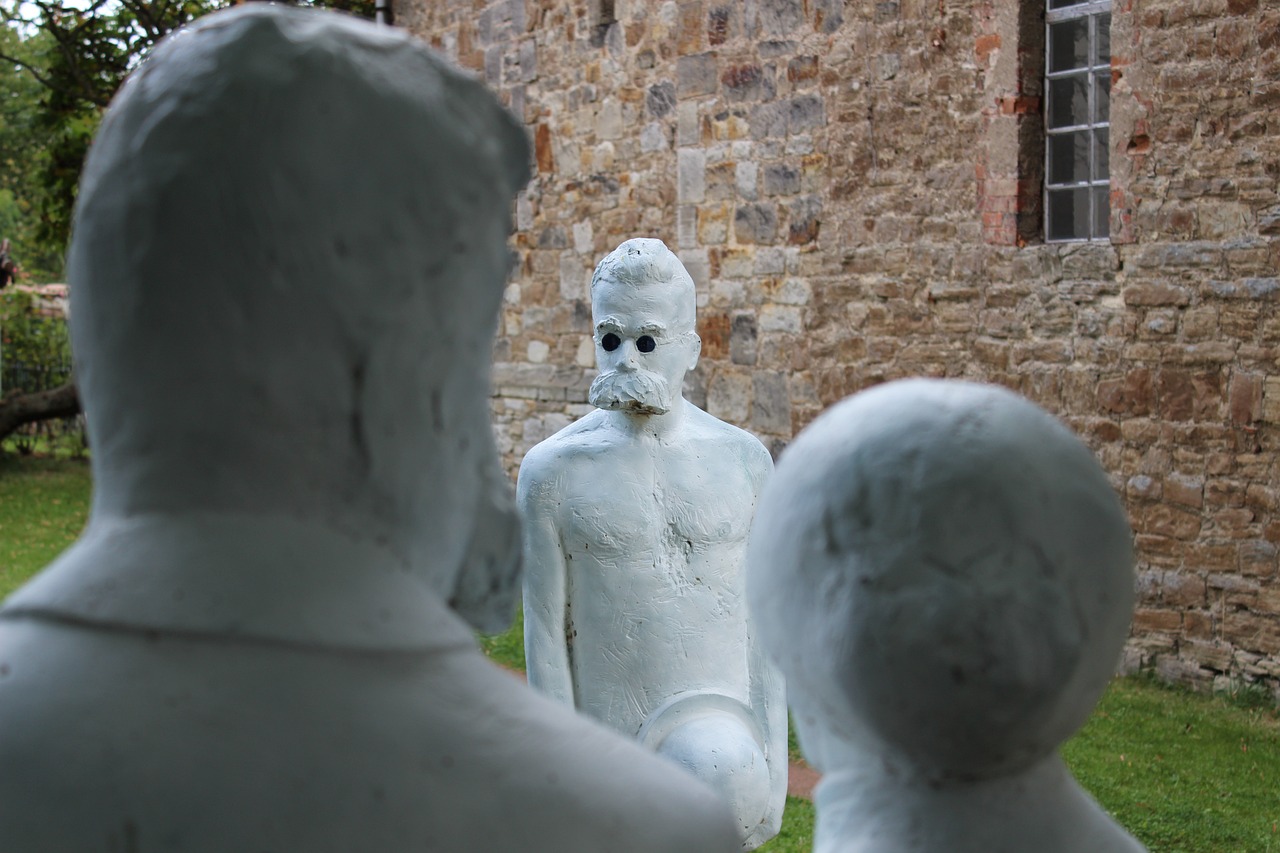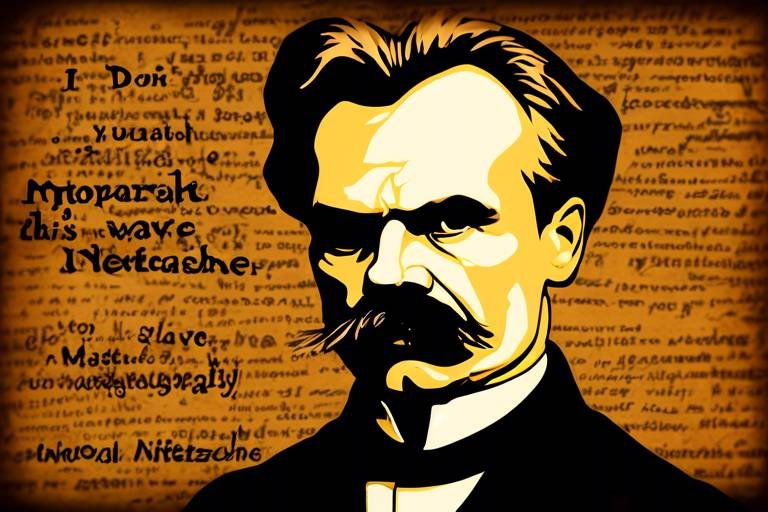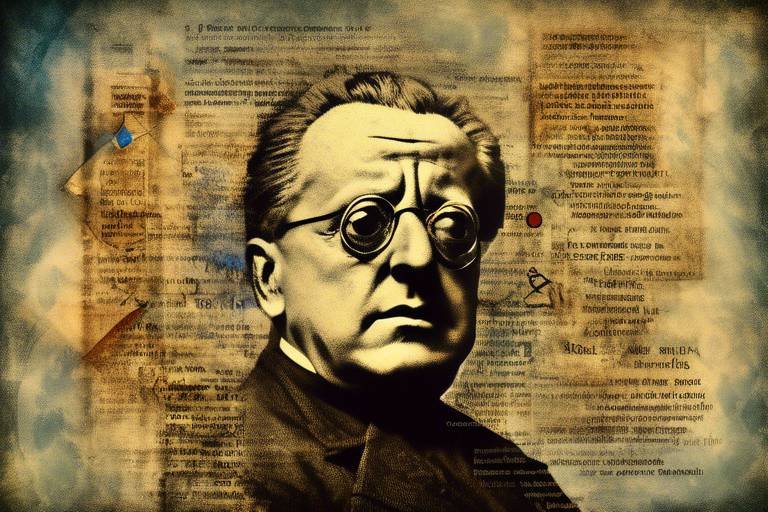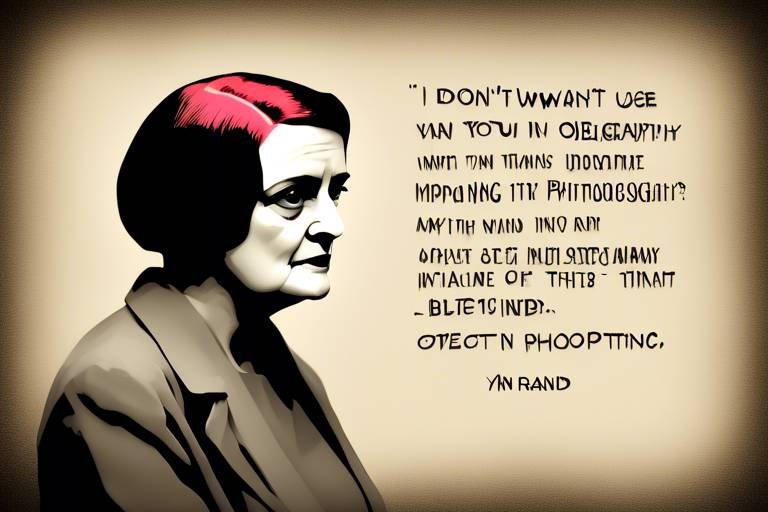Unraveling the Philosophy of Friedrich Nietzsche
Friedrich Nietzsche, a name that often stirs up a whirlwind of emotions and thoughts, is one of the most influential philosophers of the modern age. His ideas, steeped in complexity and often provocative, challenge the very fabric of traditional morality and existence. Nietzsche's philosophy isn't just a collection of theories; it's a call to arms for individuals to question societal norms, embrace their instincts, and redefine their values. In this exploration, we delve deep into Nietzsche's profound insights that continue to resonate in contemporary thought, urging us to reconsider what it means to be human in a world that often feels chaotic and devoid of meaning.
At the heart of Nietzsche's philosophy lies a fierce critique of established norms and beliefs. He pushes us to confront uncomfortable questions: What if the values we hold dear are merely constructs? What if life, in its essence, lacks inherent meaning? These inquiries are not merely academic; they serve as a springboard for personal transformation. Nietzsche invites us to step into the arena of existence, armed with the courage to forge our own paths and create personal values that resonate with our true selves.
As we navigate through Nietzsche's thoughts, we encounter themes that are not just philosophical musings but also practical guides for living authentically. His ideas on the Übermensch, nihilism, the Will to Power, and eternal recurrence encourage us to embrace our individuality and reject mediocrity. These concepts challenge us to rise above societal expectations and to live a life that is not only fulfilling but also deeply meaningful on a personal level.
In this article, we will unpack these ideas, examining how Nietzsche's philosophy can serve as both a mirror and a map for our lives. Whether you are a seasoned philosopher or someone simply curious about the human condition, Nietzsche's insights offer valuable lessons that can inspire profound change. So, buckle up as we embark on this philosophical journey that promises to be as enlightening as it is challenging!

The Concept of the Übermensch
Nietzsche's concept of the Übermensch, often translated as the Overman or Superman, is a cornerstone of his philosophical thought. This idea represents an ideal individual who transcends the conventional morality imposed by society. Imagine a person who not only defies societal norms but also creates their own values—this is the essence of the Übermensch. Nietzsche believed that in a world where traditional values were crumbling, the Übermensch would rise to redefine what it means to be human.
To Nietzsche, the Übermensch is not just a figure of strength and power; rather, they embody a profound sense of self-overcoming. They are individuals who embrace their instincts, passions, and desires, and in doing so, they reject the limitations placed upon them by societal expectations. This concept challenges us to think about our own lives: Are we living authentically, or are we merely conforming to the standards set by others? The Übermensch serves as a model for those who seek to break free from the mediocrity of conventional existence.
Furthermore, the Übermensch is often seen as a response to the nihilism that arises when traditional values lose their power. In a world that can feel chaotic and devoid of meaning, the Übermensch creates their own purpose. They do not wait for meaning to be handed to them; instead, they actively shape their destiny. This perspective invites us to consider the importance of personal responsibility and the courage it takes to forge one's own path.
In essence, the Übermensch symbolizes a revolutionary approach to life, where individuals are encouraged to rise above societal constraints and embrace their true nature. It is a call to action for each of us to reflect on our values and strive for greatness in our own lives. Nietzsche's vision of the Übermensch continues to resonate today, inspiring movements that advocate for personal empowerment and authenticity in a world that often pressures conformity.
As we ponder the implications of the Übermensch, we are reminded that becoming this ideal figure is not a destination but a journey. It requires constant reflection, growth, and the willingness to challenge ourselves and the world around us. In this way, the Übermensch is not just a philosophical ideal; it is a dynamic process of self-discovery and transformation.

Overman,
Nietzsche's idea of the Übermensch, or Overman, represents an ideal individual who transcends conventional morality to create personal values, challenging societal norms and inspiring self-overcoming. Imagine a person who stands tall against the tide of mediocrity, crafting their own path in life instead of following the crowd. The Übermensch embodies this spirit of rebellion against the status quo, advocating for a life lived with purpose and authenticity. Nietzsche believed that the Overman is not bound by the constraints of traditional morality but instead forges their own ethical compass. This notion invites us to reflect on our own lives: are we merely conforming to societal expectations, or are we daring to carve out our own destinies?
The Übermensch is not just a philosophical ideal; it is a call to action. Nietzsche challenges us to rise above our limitations, to embrace our instincts, and to pursue our passions fully. This journey of self-overcoming is not easy; it requires immense courage and introspection. The Overman is characterized by a few key traits:
- Creativity: The Overman creates values rather than adhering to those imposed by society.
- Strength: This individual possesses the inner strength to confront challenges head-on.
- Authenticity: The Overman lives truthfully and embraces their unique identity.
- Self-Determination: They are the architects of their own lives, refusing to be passive recipients of external influences.
Nietzsche's vision of the Übermensch encourages us to question our beliefs and to seek a deeper understanding of our existence. It compels us to ask ourselves: what does it mean to live a meaningful life? In a world where many are content to follow the well-trodden path, the Overman stands as a beacon of individuality and self-assertion. By embracing the idea of the Übermensch, we can find the motivation to break free from the chains of societal norms and pursue a life that is truly our own.
Nihilism, a central theme in Nietzsche's work, questions the inherent meaning of life and morality, leading to a reevaluation of values and the potential for personal liberation.
The Will to Power is a fundamental concept in Nietzsche's philosophy, emphasizing the driving force behind human behavior and the pursuit of dominance, creativity, and self-assertion.
Nietzsche explores how power dynamics shape societal structures, influencing relationships, governance, and cultural norms, ultimately advocating for the individual's rise above mediocrity.
The idea of personal empowerment through the Will to Power encourages individuals to embrace their instincts and passions, fostering a life of authenticity and self-realization.
Nietzsche's critique of religion, particularly Christianity, challenges traditional beliefs, arguing that they suppress individuality and promote a life-denying morality that hinders human potential.
The concept of eternal recurrence invites individuals to consider the implications of living their lives repeatedly, prompting reflection on choices, values, and the significance of existence.
Eternal recurrence serves as a tool for existential reflection, urging individuals to evaluate their lives and embrace a philosophy of affirmation and acceptance of their experiences.
Nietzsche's ideas have significantly influenced modern philosophy, inspiring existentialism, postmodernism, and various movements that emphasize individualism, authenticity, and the questioning of established norms.
Q: What is the Übermensch?
A: The Übermensch, or Overman, is a concept introduced by Nietzsche that represents an individual who transcends traditional morality and creates their own values.
Q: How does nihilism relate to Nietzsche's philosophy?
A: Nihilism questions the inherent meaning of life and morality, prompting a reevaluation of values and potentially leading to personal liberation.
Q: What is the Will to Power?
A: The Will to Power is a fundamental concept in Nietzsche's philosophy, emphasizing the driving force behind human behavior and the pursuit of dominance and creativity.
Q: How did Nietzsche critique religion?
A: Nietzsche critiqued religion, particularly Christianity, for suppressing individuality and promoting a morality that he believed hindered human potential.

represents an ideal individual who transcends conventional morality to create personal values, challenging societal norms and inspiring self-overcoming.
This article explores the profound and often provocative ideas of Friedrich Nietzsche, examining his views on morality, existence, and the human condition, and how they continue to influence contemporary thought.
Nietzsche's idea of the Übermensch, or Overman, represents an ideal individual who transcends conventional morality to create personal values, challenging societal norms and inspiring self-overcoming. Imagine a person who doesn’t just follow the rules set by society but instead forges their own path. This is the Übermensch—a figure who embodies strength, creativity, and a profound sense of purpose. They reject the limitations imposed by traditional moral frameworks, which often dictate what is 'right' and 'wrong' based on societal consensus rather than individual conviction.
The Übermensch is not merely a rebel without a cause; rather, they are a visionary who recognizes that the values of the past may no longer serve the needs of the present. This **transcendence** is not just about breaking away from societal expectations; it’s about actively creating a new set of values that reflect one’s true self. In this sense, the Übermensch becomes a beacon of inspiration for others, encouraging them to embark on their own journeys of self-discovery and personal empowerment.
To understand the Übermensch fully, it’s essential to recognize the context in which Nietzsche developed this concept. During his time, he observed a world grappling with the decline of religious and metaphysical certainties. People were left questioning the very foundations of morality and existence. The Übermensch emerges as a response to this existential crisis, advocating for a life lived with passion and authenticity rather than one constrained by outdated norms.
In practice, the Übermensch challenges us to ask ourselves some critical questions:
- What values do I hold, and are they truly my own?
- Am I living authentically, or am I simply conforming to societal expectations?
- How can I overcome my limitations and become the best version of myself?
By addressing these questions, we can begin to embody the spirit of the Übermensch, striving for a life that is not only fulfilling but also deeply meaningful. This journey of self-overcoming is not easy; it requires courage and a willingness to confront uncomfortable truths about oneself and the world. However, the rewards are immense, leading to a richer and more vibrant existence.
Nihilism, a central theme in Nietzsche's work, questions the inherent meaning of life and morality, leading to a reevaluation of values and the potential for personal liberation.
The Will to Power is a fundamental concept in Nietzsche's philosophy, emphasizing the driving force behind human behavior and the pursuit of dominance, creativity, and self-assertion.
Nietzsche explores how power dynamics shape societal structures, influencing relationships, governance, and cultural norms, ultimately advocating for the individual's rise above mediocrity.
The idea of personal empowerment through the Will to Power encourages individuals to embrace their instincts and passions, fostering a life of authenticity and self-realization.
Nietzsche's critique of religion, particularly Christianity, challenges traditional beliefs, arguing that they suppress individuality and promote a life-denying morality that hinders human potential.
The concept of eternal recurrence invites individuals to consider the implications of living their lives repeatedly, prompting reflection on choices, values, and the significance of existence.
Eternal recurrence serves as a tool for existential reflection, urging individuals to evaluate their lives and embrace a philosophy of affirmation and acceptance of their experiences.
Nietzsche's ideas have significantly influenced modern philosophy, inspiring existentialism, postmodernism, and various movements that emphasize individualism, authenticity, and the questioning of established norms.
- What is the Übermensch? The Übermensch is an ideal individual who creates their own values and transcends traditional morality.
- How does nihilism relate to Nietzsche's philosophy? Nihilism questions the meaning of life and morality, prompting a reevaluation of values and the potential for personal liberation.
- What is the Will to Power? The Will to Power is the driving force behind human behavior, focusing on dominance, creativity, and self-assertion.
- How has Nietzsche influenced modern thought? Nietzsche's ideas have inspired movements like existentialism and postmodernism, emphasizing individualism and authenticity.

Nihilism and Its Implications
Nihilism is often perceived as a bleak and disheartening philosophy, yet it carries profound implications for our understanding of life and existence. At its core, nihilism questions the inherent meaning of life, suggesting that traditional values and beliefs may be unfounded. This radical questioning can lead to a sense of liberation, as individuals realize they are not bound by societal expectations or moral absolutes. Instead, they are free to create their own values and meanings in a world that often seems devoid of them.
Nietzsche saw nihilism as both a challenge and an opportunity. He argued that the decline of religious and metaphysical certainties had left a void in the human experience, leading to a crisis of values. This void can be disorienting, but it also presents a chance for personal transformation. By confronting the absence of inherent meaning, individuals can embark on a journey of self-discovery, crafting their own purpose and identity. This process of reevaluation is not merely an intellectual exercise; it is a deeply personal and emotional undertaking that can lead to greater authenticity.
One of the most significant implications of nihilism is its potential to foster a sense of personal liberation. When individuals recognize that there are no absolute truths or universal moral codes, they can liberate themselves from the constraints of societal norms. This liberation can manifest in various ways:
- Creative Expression: Individuals may feel encouraged to explore their creative impulses without fear of judgment, leading to innovative ideas and artistic expressions.
- Authentic Living: By rejecting imposed values, people can live more authentically, aligning their actions with their true selves rather than adhering to external expectations.
- Resilience: Embracing nihilism can cultivate resilience, as individuals learn to navigate life's uncertainties and challenges without relying on fixed beliefs.
However, the journey through nihilism is not without its challenges. The realization that life lacks inherent meaning can lead to feelings of despair or existential angst. Nietzsche understood this struggle and emphasized the importance of confronting these feelings head-on. He believed that by embracing the chaos of existence, individuals could transform their lives into a work of art, crafting their own narrative amidst the uncertainty.
In this light, nihilism can be seen as a double-edged sword. It has the potential to liberate, but it can also overwhelm. Nietzsche's philosophy encourages individuals to embrace this tension, using it as a catalyst for growth and self-overcoming. By engaging with nihilism, one can emerge stronger, more self-aware, and equipped to navigate the complexities of the human experience.
In conclusion, nihilism serves as a profound philosophical lens through which we can examine our lives and values. It challenges us to question everything we hold dear, ultimately leading to a more authentic existence. By confronting the void left by the absence of absolute truths, we can find the freedom to create our own meaning and purpose, transforming the existential crisis into an opportunity for personal empowerment.
- What is nihilism? Nihilism is the philosophical belief that life lacks inherent meaning, value, or purpose. It often challenges traditional moral and religious beliefs.
- How did Nietzsche view nihilism? Nietzsche saw nihilism as both a crisis and an opportunity for personal growth, encouraging individuals to create their own values in the absence of absolute truths.
- Can nihilism lead to positive outcomes? Yes, nihilism can foster personal liberation, creativity, and authenticity, allowing individuals to live more fulfilling lives.

The Will to Power
The concept of the Will to Power is one of the most intriguing and fundamental ideas in Friedrich Nietzsche's philosophy. At its core, it represents a driving force that compels individuals to assert themselves, to strive for dominance, and to channel their creative energies toward self-actualization. Imagine life as a grand stage where everyone is both an actor and a playwright, constantly rewriting their scripts. This is the essence of the Will to Power—it's not merely about seeking control over others but rather about mastering oneself and the environment.
Nietzsche posits that the Will to Power is not just a desire for power in a political or social sense; it extends to the realm of personal growth and creativity. It urges us to embrace our instincts, passions, and ambitions. In this way, the Will to Power serves as a catalyst for personal transformation. Just as a seed must push through the soil to reach the sunlight, individuals must confront challenges and obstacles to grow into their fullest potential.
This concept can be broken down into several key aspects:
- Self-Overcoming: The Will to Power encourages individuals to transcend their limitations, pushing them to become more than they are. It's about breaking free from societal constraints and embracing one's true nature.
- Creative Expression: Nietzsche believed that creativity is a manifestation of the Will to Power. Artists, thinkers, and innovators channel this force to create new ideas, art, and philosophies that challenge the status quo.
- Life Affirmation: Embracing the Will to Power means affirming life, with all its chaos and unpredictability. It’s about finding meaning in the struggle and chaos of existence rather than succumbing to despair.
Nietzsche's exploration of power dynamics also sheds light on how this concept influences societal structures. He argues that the Will to Power is not just an individual phenomenon but a pervasive force that shapes relationships, governance, and cultural norms. The struggle for power can manifest in various forms, from interpersonal relationships to larger societal conflicts. This perspective invites us to reconsider our understanding of authority and influence, prompting a deeper inquiry into how power operates in our lives.
Moreover, the Will to Power is intricately linked to the notion of personal empowerment. Nietzsche champions the idea that individuals should harness their inner strength and instincts to forge their own paths. This empowerment is not about following the herd; it’s about embracing one’s unique identity and desires. In a world that often pressures conformity, the Will to Power serves as a reminder that true fulfillment comes from within.
In essence, the Will to Power is a call to action. It beckons us to engage with life fully, to challenge ourselves, and to strive for greatness. Nietzsche's philosophy encourages us to recognize our potential and to act upon it, fostering a life rich with authenticity and purpose. Just as a river carves its path through the landscape, so too must we carve our own destinies, driven by the powerful currents of our will.
- What is the Will to Power?
The Will to Power is a central concept in Nietzsche's philosophy that represents the fundamental driving force behind human behavior, emphasizing self-assertion, creativity, and the pursuit of personal mastery.
- How does the Will to Power relate to personal empowerment?
It encourages individuals to embrace their instincts and passions, fostering a life of authenticity and self-realization, allowing them to rise above societal norms and expectations.
- Is the Will to Power only about dominance over others?
No, it is primarily about mastering oneself and one's environment, focusing on personal growth and creative expression rather than merely seeking control over others.

Power Dynamics in Society
Friedrich Nietzsche had a unique lens through which he viewed the complexities of power dynamics in society. He believed that power is not merely a tool wielded by those in authority but a fundamental aspect of human existence that shapes our interactions and societal structures. To Nietzsche, power is everywhere; it permeates our relationships, institutions, and even our thoughts. This perspective invites us to reconsider how we perceive authority and influence, urging us to recognize that power dynamics are often subtle and insidious.
One of the most compelling aspects of Nietzsche's philosophy is his assertion that societal structures often stifle individual potential. He argued that the prevailing norms and values imposed by society can create a form of mediocrity, where individuals conform rather than strive for greatness. Nietzsche's concept of the Übermensch serves as a counterpoint to this mediocrity, representing an individual who rises above societal constraints to create their own values and assert their power.
In examining the power dynamics at play, Nietzsche encourages us to question the legitimacy of authority. He posits that traditional hierarchies often uphold a morality that serves the interests of the powerful rather than the individual. This critique of power structures is crucial for understanding how individuals can reclaim their agency. It’s a call to arms for those who feel stifled by societal expectations to embrace their instincts, passions, and desires.
Moreover, Nietzsche's insights into power can be seen as a reflection of the broader societal landscape. In a world where social media and technology amplify voices, the dynamics of power are shifting. Individuals now have the opportunity to challenge established norms and assert their influence in unprecedented ways. This evolution aligns with Nietzsche's vision of personal empowerment, where individuals are encouraged to harness their creative energies and assert their will in a society that often discourages such expressions.
To illustrate this further, consider the following table that summarizes Nietzsche's views on power dynamics:
| Aspect | Nietzsche's Perspective |
|---|---|
| Authority | Often a reflection of societal norms that suppress individuality. |
| Individual Empowerment | Essential for transcending mediocrity and asserting personal values. |
| Creative Expression | A vital aspect of the Will to Power that fosters authenticity. |
| Societal Norms | Can inhibit personal growth and self-actualization. |
In conclusion, Nietzsche's exploration of power dynamics in society serves as a profound reminder of the importance of individuality and self-assertion. By understanding and challenging the power structures that surround us, we can begin to forge a path toward authenticity and personal empowerment. Nietzsche’s philosophy urges us not just to accept our circumstances but to actively shape them, creating a life that reflects our true selves.
- What is the Übermensch? The Übermensch, or Overman, is an ideal figure in Nietzsche's philosophy who transcends conventional morality to create personal values.
- How does Nietzsche define power? Nietzsche views power as a fundamental driving force behind human behavior, influencing relationships and societal structures.
- What role does nihilism play in Nietzsche's philosophy? Nihilism challenges the inherent meaning of life, prompting a reevaluation of values and the potential for personal liberation.
- How can Nietzsche's ideas be applied today? Nietzsche's philosophy encourages individuals to embrace their instincts and passions, fostering a life of authenticity in modern society.

Personal Empowerment
Personal empowerment is a cornerstone of Nietzsche's philosophy, and it resonates deeply with those seeking to carve their own paths in life. Imagine standing at the edge of a vast landscape, where the horizon stretches endlessly before you, filled with possibilities. This is the essence of personal empowerment: the recognition that you hold the reins to your own existence. Nietzsche believed that embracing the Will to Power allows individuals to tap into their innate instincts and passions, leading to a life that is not only authentic but also profoundly fulfilling.
In a world often dominated by societal expectations and norms, Nietzsche’s call for personal empowerment encourages us to break free from the chains of conformity. It’s about challenging the status quo and daring to live according to one’s own values. Think of it as a journey of self-discovery, where each step taken is a declaration of independence from external influences. By embracing our true selves, we can transcend mediocrity and strive for greatness.
Nietzsche posited that personal empowerment is not just about individual success; it’s also about the impact we have on others. When we empower ourselves, we inadvertently inspire those around us to do the same. It creates a ripple effect, fostering a community where authenticity thrives. This is where the idea of the Übermensch, or Overman, comes into play. The Übermensch embodies the ultimate expression of personal empowerment, forging new values and living a life that challenges conventional morality.
However, the journey to personal empowerment is not without its challenges. It requires a deep introspection and the courage to confront uncomfortable truths about ourselves. It’s akin to embarking on an expedition into uncharted territory; the path may be fraught with obstacles, but the rewards are immense. Here are some key aspects to consider on this journey:
- Self-Awareness: Understanding your strengths, weaknesses, and desires is crucial. This self-awareness acts as a compass, guiding your decisions and actions.
- Resilience: Embracing setbacks as learning opportunities fosters resilience. Nietzsche famously said, "What does not kill me makes me stronger," highlighting the importance of overcoming adversity.
- Authenticity: Living in alignment with your true self is essential. This means shedding societal expectations and embracing who you are at your core.
Ultimately, personal empowerment through the Will to Power is about embracing your instincts and passions, fostering a life rich in authenticity and self-realization. It invites you to step into your power and challenge the limitations imposed by society. As you navigate this journey, remember that the path may be winding, but every twist and turn is an opportunity for growth. So, are you ready to take the leap and empower yourself?
1. What is personal empowerment according to Nietzsche?
Personal empowerment, in Nietzsche's philosophy, refers to the process of embracing one's instincts and passions to live authentically and challenge societal norms.
2. How does the concept of the Will to Power relate to personal empowerment?
The Will to Power is the driving force behind human behavior, emphasizing the importance of self-assertion and creativity in the pursuit of personal empowerment.
3. Why is self-awareness important for personal empowerment?
Self-awareness helps individuals understand their strengths and weaknesses, guiding them in making choices that align with their true selves.
4. Can personal empowerment impact others?
Yes, when individuals empower themselves, they inspire those around them to pursue their own paths, creating a community that values authenticity and self-realization.

Critique of Religion
Friedrich Nietzsche's critique of religion, particularly his views on Christianity, is one of the most provocative aspects of his philosophy. He argued that traditional religious beliefs often suppress individuality and creativity, promoting a morality that is fundamentally life-denying. For Nietzsche, the moral frameworks established by religion create a set of constraints that inhibit human potential and authentic self-expression. He famously declared that "God is dead," a statement that encapsulates his belief that the decline of religious authority opens up a space for individual freedom and self-determination.
Nietzsche believed that religion often instills a sense of guilt and sinfulness, which can lead to a denial of one's instincts and desires. This moral framework, he argued, is rooted in a fear of life itself, promoting values that are contrary to human flourishing. Instead of embracing their passions and instincts, individuals are taught to suppress them in favor of a higher moral calling. In this way, Nietzsche viewed religion as a mechanism of control that stifles personal growth and encourages conformity.
He also critiqued the concept of an afterlife, arguing that it distracts individuals from fully engaging with their current existence. Nietzsche challenged the idea that one's life should be lived in anticipation of a reward beyond death, suggesting instead that we should focus on creating meaning in our lives here and now. This perspective invites us to consider the importance of the present moment and the significance of our actions in shaping our reality.
To further illustrate his critique, consider the following points:
- Suppression of Individuality: Nietzsche believed that religious doctrines often discourage personal exploration and self-discovery.
- Moral Absolutism: He argued that the rigid moral codes imposed by religion can lead to a lack of flexibility in moral reasoning.
- Fear of Life: Nietzsche posited that religious beliefs often promote a fear of the natural world, leading to a denial of life's inherent chaos and unpredictability.
Ultimately, Nietzsche's critique of religion is not merely an attack on belief systems; it's a call to embrace our humanity fully. He encourages individuals to reject the imposed moralities of the past and to create their own values, thus leading to a more authentic and fulfilling existence. By challenging the status quo, Nietzsche invites us to embark on a journey of self-discovery, where we can assert our own identities and live life to the fullest.
- What does Nietzsche mean by "God is dead"?
Nietzsche's statement signifies the decline of traditional religious authority and the implications it has for morality and meaning in life. - How does Nietzsche view morality?
He believes that morality is a construct shaped by societal norms and that individuals should create their own values. - What is the significance of the Übermensch in Nietzsche's philosophy?
The Übermensch represents an ideal individual who transcends conventional morality to create personal values and inspire self-overcoming. - How does Nietzsche's critique of religion influence modern thought?
His ideas have paved the way for existentialism and postmodernism, emphasizing individualism and the questioning of established norms.

Eternal Recurrence
The concept of is one of Friedrich Nietzsche's most intriguing and thought-provoking ideas. Imagine living your life over and over again, exactly the same way, for eternity. Sounds daunting, right? Yet, this notion serves as a powerful philosophical tool that prompts us to reflect deeply on our choices, values, and the significance of our existence. Nietzsche challenges us to consider: if we were to relive our lives in the exact same manner, would we embrace it or recoil in horror? This thought experiment invites us to evaluate our lives with a critical eye, urging us to live in a way that we would be willing to experience again and again.
At its core, eternal recurrence is about affirmation—the idea that we should not only accept our lives but celebrate them. Nietzsche believed that if one could affirm their existence to such an extent that they would willingly relive every moment, it would signify a profound acceptance of life itself. This perspective encourages a shift from a passive existence to an active engagement with life, where we take ownership of our decisions and their consequences. It pushes us to ask ourselves whether we are living authentically or merely going through the motions.
To illustrate this concept further, let’s consider a few key points about eternal recurrence:
- Reflection on Choices: Each decision we make shapes our future. Eternal recurrence compels us to think critically about our choices and their long-term implications.
- Value of Life: If we were to live our lives repeatedly, the value we place on our experiences becomes paramount. Are we making choices that align with our true desires?
- Living Authentically: The idea encourages us to break free from societal expectations and live a life that genuinely reflects who we are.
In this light, eternal recurrence is not merely a philosophical musing but a practical framework for living. It encourages us to embrace our passions, confront our fears, and pursue a life filled with meaning. Nietzsche’s challenge is clear: if we want to live a life we would be proud to repeat, we must strive for authenticity and self-realization.
Furthermore, the implications of eternal recurrence extend beyond the individual; they resonate within the broader context of society. If individuals were to live with the awareness of eternal recurrence, it could lead to a more compassionate and thoughtful community. People might be more inclined to consider the impact of their actions on others, fostering a culture of empathy and understanding.
Ultimately, Nietzsche’s concept of eternal recurrence serves as a mirror reflecting our lives back at us. It asks us to ponder whether we are living in a way that we would joyfully repeat. Are we seizing opportunities, embracing challenges, and nurturing our passions? Or are we allowing life to pass us by? By engaging with this profound idea, we can cultivate a deeper appreciation for our existence and strive for a life that is not only worth living but worth reliving.
- What is eternal recurrence? Eternal recurrence is the philosophical concept that suggests one would have to live their life over and over again, experiencing the same events and choices eternally.
- How does eternal recurrence influence our choices? It encourages individuals to reflect on their decisions, promoting a life lived with intention and authenticity.
- Why is eternal recurrence important in Nietzsche's philosophy? It underscores the importance of life affirmation and challenges individuals to evaluate the significance of their existence.

Existential Reflection
The concept of eternal recurrence serves as a profound catalyst for , challenging us to ponder the very essence of our lives. Imagine living your life over and over again, exactly as you have lived it, for eternity. This thought experiment, proposed by Nietzsche, compels us to scrutinize our choices, values, and the significance we attach to our experiences. It’s not just a philosophical musing; it’s a call to action, inviting us to embrace our lives with a sense of urgency and authenticity.
When we consider the implications of eternal recurrence, we are faced with a pivotal question: If you had to relive your life in its entirety, would you be satisfied with your decisions? Would you celebrate your achievements and accept your failures? Such reflections can lead to profound insights about how we navigate our existence. Nietzsche challenges us to live in such a way that we would welcome the idea of eternal recurrence, making choices that resonate deeply with our true selves.
To facilitate this reflection, let’s break down some key aspects of existential reflection inspired by Nietzsche’s philosophy:
- Authenticity: Are you living a life true to your values, or are you merely conforming to societal expectations?
- Responsibility: Acknowledge that your choices shape your reality. Are you taking full responsibility for your actions?
- Embrace of Life: Do you celebrate life’s joys and endure its sorrows with grace, or do you shy away from discomfort?
This introspective journey encourages individuals to embrace a philosophy of affirmation, where every experience—whether joyous or painful—is seen as a vital part of the human condition. Nietzsche’s existential reflection pushes us to not only accept our past but to actively shape our future. The essence of this reflection lies in the empowerment it offers; it invites us to take the reins of our lives, to mold our destinies, and to live with an awareness that our choices matter.
In essence, existential reflection through the lens of eternal recurrence is about cultivating a life that feels meaningful. It’s about asking yourself the tough questions and being honest in your answers. When we reflect on our lives with the idea of eternal recurrence in mind, we are not merely spectators; we become the architects of our own existence, crafting a life we would be proud to relive.
- What is existential reflection? Existential reflection involves deep contemplation of one’s life choices, values, and the significance of existence, often inspired by philosophical concepts like eternal recurrence.
- How does Nietzsche's idea of eternal recurrence affect our lives? It challenges individuals to evaluate their decisions and encourages living authentically, as if every moment would be repeated indefinitely.
- Why is authenticity important in existential reflection? Authenticity ensures that we live in alignment with our true selves, making choices that resonate with our values and beliefs.

Impact on Modern Philosophy
Friedrich Nietzsche's influence on modern philosophy is nothing short of revolutionary. His radical ideas have reshaped the way we think about existence, morality, and the very essence of what it means to be human. Nietzsche's philosophy serves as a catalyst for various intellectual movements, igniting discussions that challenge the status quo and provoke deep existential inquiries. Think about it: how many philosophers today are willing to confront uncomfortable truths about our beliefs and values? Nietzsche was one of the first to do so, and his legacy continues to resonate.
Nietzsche's critique of traditional morality and religion has paved the way for existentialism, a philosophical movement that emphasizes individual freedom and choice. Think of existentialists like Jean-Paul Sartre and Simone de Beauvoir, who were profoundly influenced by Nietzsche's ideas. They picked up the torch he lit and ran with it, exploring themes of authenticity, responsibility, and the absurdity of life. For them, the absence of inherent meaning in life—an idea Nietzsche championed—became a foundation upon which they built their own philosophies.
Furthermore, Nietzsche's concept of the Übermensch has inspired various interpretations in contemporary thought. It encourages individuals to break free from societal constraints and create their own values. This idea resonates in modern discussions about self-actualization and personal empowerment. In a world where conformity often reigns supreme, Nietzsche's call to transcend mediocrity and embrace one's unique potential is more relevant than ever.
Moreover, Nietzsche's thoughts on nihilism have sparked significant dialogue within postmodernism. Postmodern thinkers, such as Michel Foucault and Jacques Derrida, have drawn from Nietzsche's skepticism toward grand narratives and absolute truths. They challenge the very foundations of knowledge and authority, echoing Nietzsche's assertion that "God is dead," a metaphor for the decline of traditional values in the modern world. This shift has led to a new understanding of power dynamics, identity, and culture.
In essence, Nietzsche's philosophy serves as a mirror reflecting the complexities of the human condition. He invites us to confront our own beliefs, question societal norms, and embrace the chaos of existence. His emphasis on individualism and the necessity of crafting one's own path continues to inspire countless thinkers, artists, and everyday individuals seeking meaning in an increasingly fragmented world.
Ultimately, Nietzsche's impact on modern philosophy is a testament to his enduring relevance. He challenges us to think critically, act authentically, and live passionately. As we navigate through the complexities of our own lives, Nietzsche's insights remind us that the journey toward self-discovery and empowerment is not only possible but essential.
- What is Nietzsche's philosophy primarily about? Nietzsche's philosophy revolves around the critique of traditional morality, the concept of the Übermensch, and the exploration of nihilism and existentialism.
- How did Nietzsche influence existentialism? Nietzsche's emphasis on individual choice and the absence of inherent meaning laid the groundwork for existentialist thinkers who followed him, encouraging them to explore themes of authenticity and personal responsibility.
- What does the term 'Übermensch' mean? The term 'Übermensch' or 'Overman' refers to an ideal individual who transcends conventional morality to create personal values and inspire self-overcoming.
- Why is nihilism important in Nietzsche's work? Nihilism questions the inherent meaning of life and morality, prompting a reevaluation of values and offering the potential for personal liberation.
Frequently Asked Questions
- What does Nietzsche mean by the Übermensch?
The Übermensch, or Overman, is Nietzsche's vision of an ideal individual who rises above conventional morality. This concept encourages people to create their own values and challenge societal norms, inspiring a journey of self-overcoming and personal empowerment.
- How does Nietzsche define nihilism?
Nihilism, in Nietzsche's philosophy, refers to the rejection of inherent meaning in life and morality. It invites individuals to reevaluate their values, leading to a potential liberation from traditional constraints and an opportunity for personal growth.
- What is the Will to Power?
The Will to Power is a core idea in Nietzsche's thought, emphasizing the fundamental drive behind human behavior. It represents the pursuit of dominance, creativity, and self-assertion, suggesting that individuals should embrace their instincts to live authentically.
- How does Nietzsche critique religion?
Nietzsche's critique of religion, particularly Christianity, posits that it suppresses individuality and promotes a life-denying morality. He argues that such beliefs hinder human potential and discourage people from pursuing their true selves.
- What is the significance of eternal recurrence?
The concept of eternal recurrence challenges individuals to consider the implications of living their lives repeatedly. It serves as a powerful tool for existential reflection, prompting people to evaluate their choices and embrace a philosophy of affirmation regarding their experiences.
- How have Nietzsche's ideas influenced modern philosophy?
Nietzsche's philosophies have significantly impacted modern thought, inspiring movements like existentialism and postmodernism. His emphasis on individualism and authenticity encourages questioning established norms and fosters a deeper exploration of human existence.



















